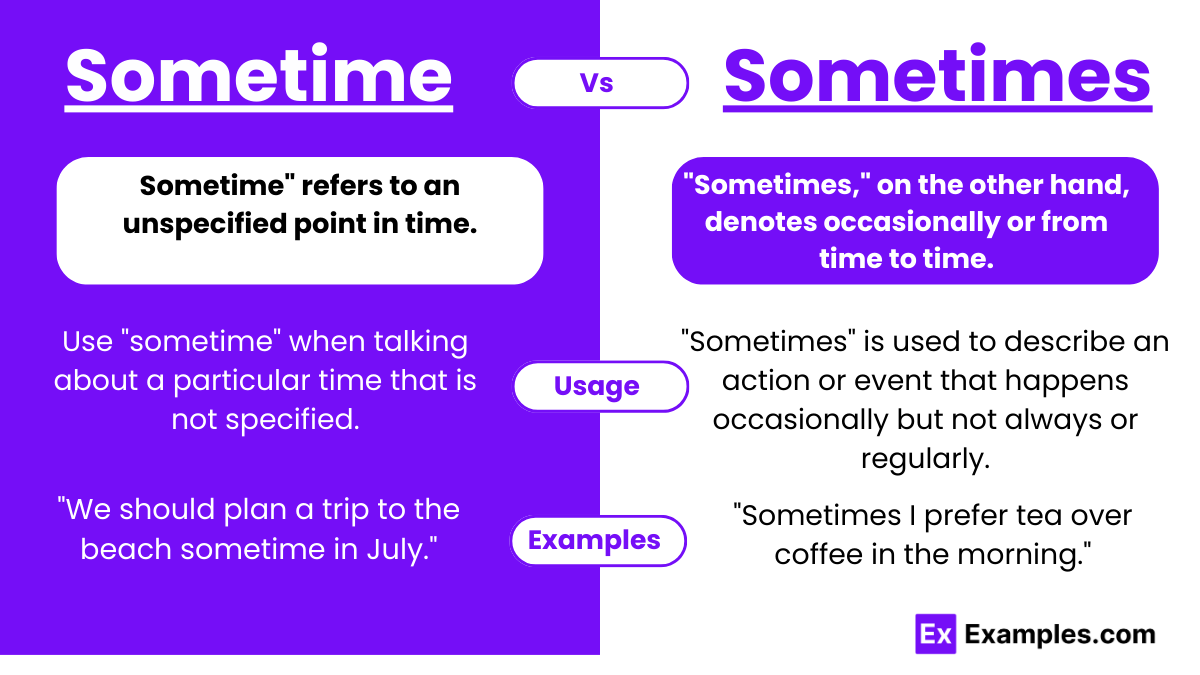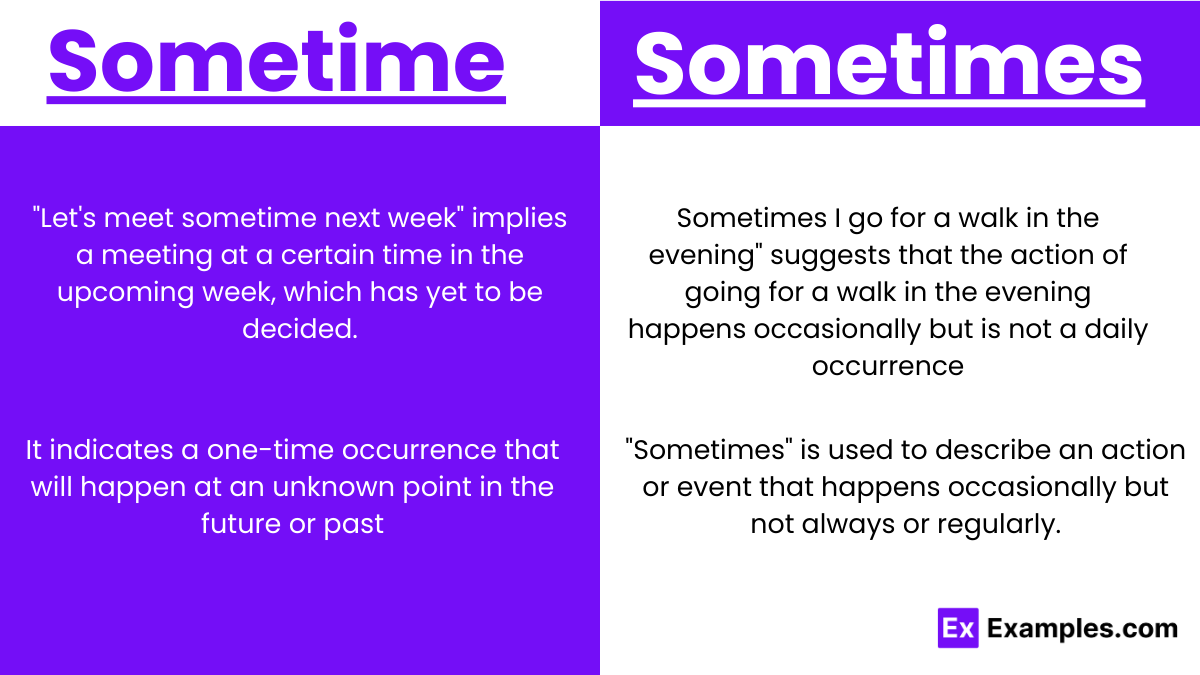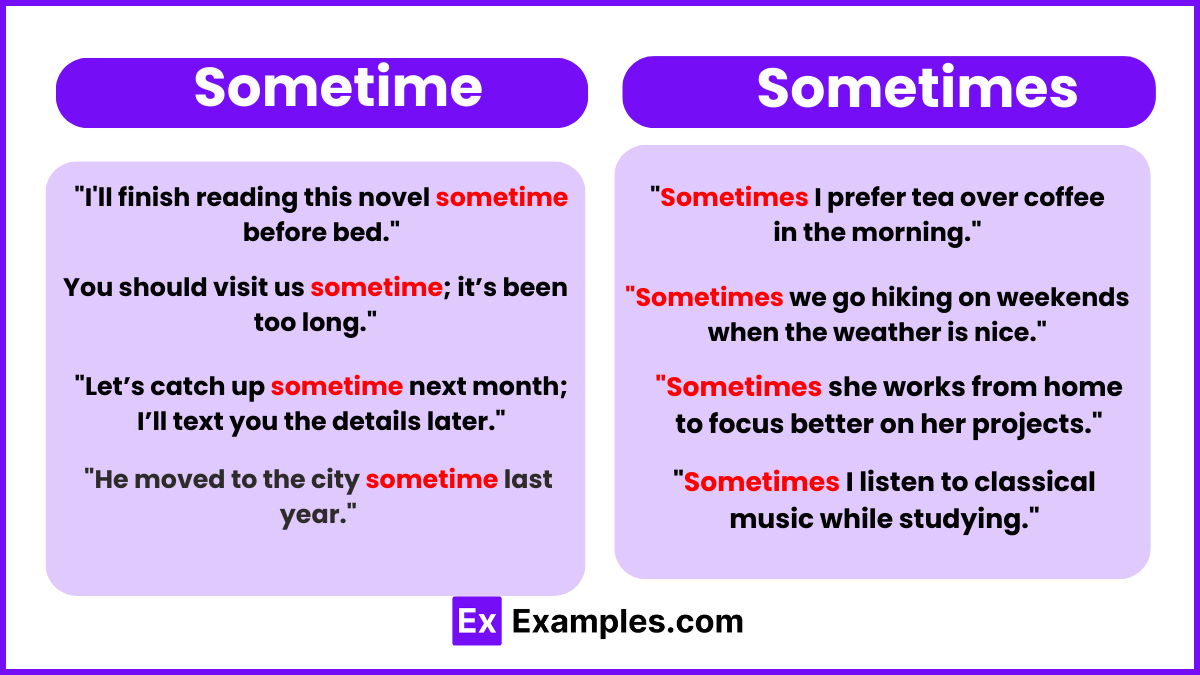Sometime vs Sometimes
In the realm of English language nuances, the distinction between “sometime” and “sometimes” offers a fascinating glimpse into how slight variations can subtly alter meaning. These two adverbs, while seemingly similar, serve distinct purposes and contexts in conversation and writing. Understanding their differences enhances clarity and precision in communication, allowing speakers and writers to convey time-related nuances effectively. Let’s delve into the intricacies of “sometime” and “sometimes” to demystify their usage and ensure you can apply them with confidence in your daily interactions and literary endeavors.
Sometime and Sometimes – Meaning
- “Sometime” refers to an unspecified point in time. It does not indicate frequency but rather a specific yet undefined moment, either in the future or the past. It’s often used to suggest a time that is not fixed or known but is expected to occur. For instance, “Let’s meet sometime next week” implies a meeting at a certain time in the upcoming week, which has yet to be decided.
- “Sometimes,” on the other hand, denotes occasionally or from time to time. It is used to describe frequency, indicating that something happens now and then but not always or consistently. For example, “Sometimes I go for a walk in the evening” suggests that the action of going for a walk in the evening happens occasionally but is not a daily occurrence
Summary
Understanding the distinction between “sometime” and “sometimes” is crucial for accurate and nuanced communication. “Sometime” is used when referring to a specific, albeit unspecified, point in time, indicating a singular occurrence that is expected to happen but without a set date or time. Conversely, “sometimes” speaks to frequency, illustrating actions or events that occur occasionally but not regularly. This differentiation is essential for conveying the correct temporal nuances in both spoken and written English. Grasping these subtleties enables speakers and writers to express timing and frequency with greater precision, enhancing the clarity and effectiveness of their communication
How To Pronounce Sometime and Sometimes
Pronunciation of “Sometime”
- Phonetic Spelling: /ˈsʌm.taɪm/
- Breakdown: This word consists of two parts. The first part “sum” sounds like the word “sum” in mathematics. The second part “time” is pronounced just like the word “time,” with a long “i” sound and a silent “e” at the end.
Pronunciation of “Sometimes”
- Phonetic Spelling: /ˈsʌm.taɪmz/
- Breakdown: Very similar to “sometime,” but with an “s” sound added at the end. The first part “sum” is pronounced the same way. The “time” part is also the same, but the “s” at the end is pronounced as a soft “z” sound, making it “times.”
Understanding the subtle difference in pronunciation between “sometime” and “sometimes” helps in correctly using these words. “Sometime” refers to an unspecified point in time, whereas “sometimes” means occasionally or from time to time.
When to Use Sometime and Sometimes
Using Sometime
- Refers to a Specific but Unspecified Time: Use “sometime” when talking about a particular time that is not specified. It indicates a one-time occurrence that will happen at an unknown point in the future or past.
Using Sometimes
- Indicates Occasional Frequency: “Sometimes” is used to describe an action or event that happens occasionally but not always or regularly. It’s about frequency rather than timing.
Key Differences
- Specificity vs. Frequency: “Sometime” is about a specific, albeit unknown, time. “Sometimes” speaks to the frequency of an event occurring now and then.
- Singular Event vs. Recurring Events: “Sometimes” usually refers to a singular event that could happen or has happened. “Sometimes” is used for events that recur occasionally over time.
Examples Using Sometime Sometimes
Examples Using Sometime
- Future Plans: “We should plan a trip to the beach sometime in July.”
- Undecided Timing: “I’ll finish reading this novel sometime before bed.”
- General Suggestion: “You should visit us sometime; it’s been too long.”
- Vague Future Event: “Let’s catch up sometime next month; I’ll text you the details later.”
- Indefinite Past: “He moved to the city sometime last year.”
Examples Using Sometimes
- Habitual Variation: “Sometimes I prefer tea over coffee in the morning.”
- Occasional Activity: “Sometimes we go hiking on weekends when the weather is nice.”
- Irregular Occurrences: “Sometimes she works from home to focus better on her projects.”
- Preference Fluctuation: “Sometimes I listen to classical music while studying.”
- Sporadic Socializing: “Sometimes we meet after work for a quick catch-up.
Synonyms for Sometime and Sometimes
| “Sometime” Synonyms | Context or Nuance | “Sometimes” Synonyms | Context or Nuance |
|---|---|---|---|
| Eventually | Implies that something will happen at an unspecified future time. | Occasionally | Happens from time to time but not regularly. |
| At some point | A vague reference to a future or past time, without specifying when. | Periodically | Happens at regular intervals, though not frequently. |
| One day | Implies a future time, often with a hopeful or speculative tone. | Now and then | Similar to occasionally, but with a casual tone. |
| In due time | Suggests that something will happen when it is supposed to, without rush. | From time to time | Happens occasionally, without a specific pattern. |
| Sooner or later | Indicates that something will happen, but the timing is uncertain. | At times | Used to describe something that happens occasionally |
Exercise
Fill in the blank with the correct form of Sometime vs Sometimes
- “Is there __________ who can help me move this furniture?”
- “I’m sure __________ left their jacket in the conference room yesterday.”
- “Could __________ please turn off the lights before leaving?”
- “We need to find __________ with expertise in web development for our new project.”
- “__________ must have seen who took the last piece of cake from the kitchen.”
- “I heard __________ knocking at the door, but when I checked, there was no one there.”
- “__________ needs to address this issue before it escalates further.”
- “At the party, I felt like __________ was watching me from across the room.”
- “If __________ has any objections to the proposed plan, please speak up now.”
- “We’re looking for __________ who can volunteer to organize the charity event next month.”
Answers
- someone
- somebody
- someone
- someone
- somebody
- somebody
- Someone
- somebody
- someone
- somebody




